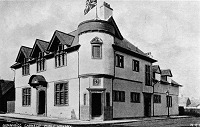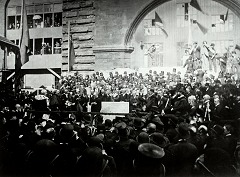Contents ![]() | Introduction
| Introduction ![]() | Institutes of learning
| Institutes of learning ![]()

Public libraries and endowed libraries
Page 1 of 2 | Next
By the middle of the 19th century libraries in the Lothians and Fife were a mis-mash of large and small institutions. A few were free but many charged. Most had shelves full of old stock that few people wanted to read. Although libraries were commonplace in towns, villages and the workplace they often suffered from restrictive purchasing plans. This could leave them with stock nobody wanted to read or which had been read by the entire membership. Consequently, withdrawals and members had a tendency to fall off over time. A campaign was launched to try and good free libraries into every community. The free public libraries were driven by legislation and the enthusiasm of Dunfermline's Andrew Carnegie.
'Free' public libraries
In 1853 the Public Library Act (Scotland) was passed which enabled burghs to raise 'a penny rate for library services' (that is, a levy of an extra penny in the pound applied to local taxes, or rates). However, they had to get a majority vote from amongst ratepayer voters before they could so. Few authorities accepted the Act, as the extra penny charge was not popular with ratepayers (the people that elected them and paid for local services).

Edinburgh provides a study of the free libraries campaign. It was the last Scottish city to accept the Act, possibly because it was so well supplied with alternatives. According to the librarian of Edinburgh University writing in 1880 'Much remains to be done before it (Edinburgh) has secured for its poorer citizens the same facilities for intellectual advancement which other large towns (where the Library acts are in operation) have provided for their humblest dwellers'. However, attempts to make the council adopt the act were met with vociferous protests.
Page 1 of 2 | Next
In this section:
Circulating libraries | Subscription libraries | Itinerating libraries | Free public libraries
Contents ![]() | Introduction
| Introduction ![]() | Institutes of learning
| Institutes of learning ![]()